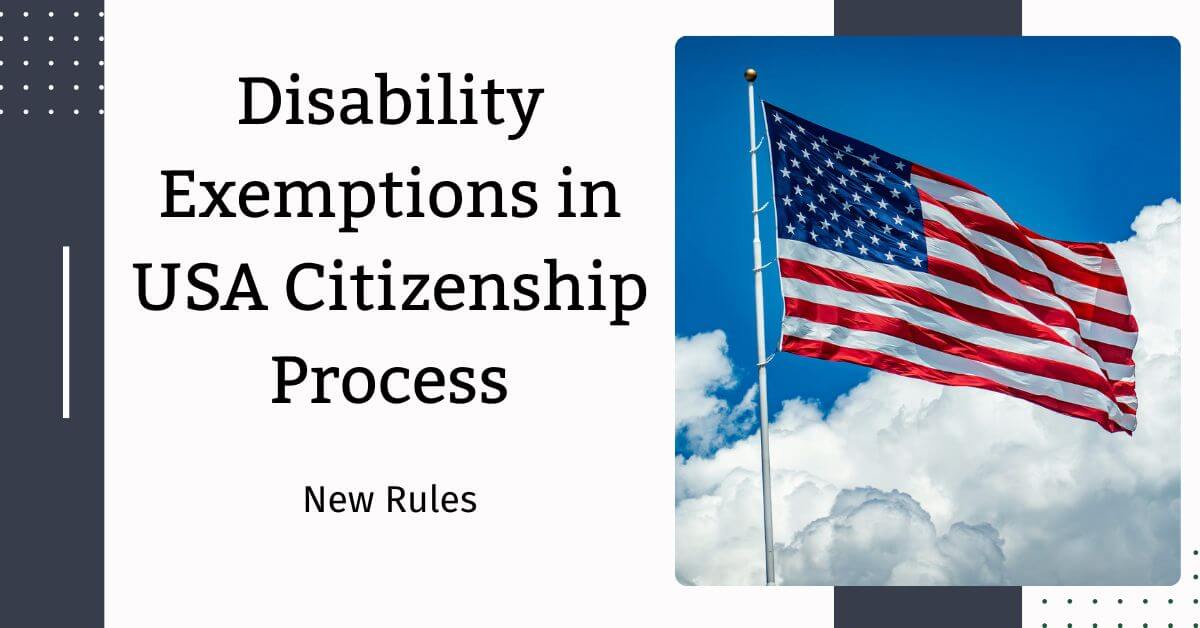Disability Exemptions in USA Citizenship Process 2025 – New Rules

Pay particular attention if you intend to claim the handicap exemption when you seek for U.S. citizenship through naturalization. Beginning on June 13, 2025, there will be a significant change in the way USCIS processes Form N-648 (Medical Certification for Disability Exceptions).
What’s This All About?
New policy guidelines have been released by the U.S. Citizenship and Immigration Services (USCIS) to improve the disability exemption review procedure. This means that there will be more scrutiny of applicants who submit Form N-648 to request exemptions from the English language and U.S. civics requirements because of a disability.
Why? Since doctors have been approving infirmities that don’t actually prevent candidates from fulfilling the criteria of the citizenship test, the system has been beset by fake certifications for years. USCIS claims that this has weakened the system’s fairness and made it possible for some applicants to unfairly get around legal requirements.
List of Disability Exemptions in USA Citizenship Process:
Medical Disability Exceptions for US Citizenship:
Medical disability exceptions for US citizenship allow applicants with certain physical or mental impairments to be exempt from the English and civics testing requirements during the naturalization process. To qualify, individuals must demonstrate that their condition significantly limits their ability to learn or remember information. Applicants need to submit Form N-648, Medical Certification for Disability Exceptions, completed by a licensed medical professional. These exceptions provide fair access to naturalization for immigrants whose health conditions prevent them from meeting standard testing criteria.
N-648 Disability Waiver for Naturalization:
The N-648 disability waiver for naturalization is a critical form for applicants seeking an exemption from the English language and civics tests due to a medical disability. The form must be completed by a licensed physician, clinical psychologist, or osteopath, clearly describing the applicant’s diagnosis, severity, and how it affects their ability to meet testing requirements. This waiver helps ensure that eligible immigrants with documented medical conditions still have a pathway to U.S. citizenship, without being unfairly excluded due to health limitations.
Cognitive Impairment Citizenship Exemptions USA:
Cognitive impairment citizenship exemptions in the USA apply to immigrants with medical conditions such as Alzheimer’s disease, dementia, traumatic brain injuries, or other cognitive disorders. These conditions may prevent applicants from demonstrating the knowledge required for standard naturalization tests. By filing Form N-648, applicants can request an exemption if a licensed healthcare provider certifies their impairment. These exemptions ensure that individuals with long-term or permanent cognitive disabilities are not denied the chance to become U.S. citizens.
Physical Disability Waivers in US Naturalization:
Physical disability waivers in U.S. naturalization help applicants who cannot complete the standard English or civics tests due to serious physical limitations, such as severe mobility impairments, neurological conditions, or chronic illnesses. A medical professional must certify the applicant’s condition through Form N-648, explaining why their disability prevents participation in testing. These waivers recognize that individuals with legitimate health challenges should still be able to achieve U.S. citizenship, ensuring equal access under immigration law.
Who Does This Impact?
All new naturalization applicants who file Form N-648 on or after June 13, 2025, are subject to this policy. You must now present a thorough and reliable medical explanation if you are requesting an exemption from the English/civics section of the naturalization test because of a mental or physical disability.
The catch is that simply having a disability is insufficient. Your health needs to:
- Be determined by medicine,
- Have persisted (or are anticipated to persist) for a minimum of 12 months
- Directly hinder your ability to acquire civics and English.
Additionally, rather than just stating the issue, your doctor must describe in detail how your handicap impairs your capacity to learn.
What’s New and Stricter?
- No more approvals with a rubber stamp. A credibility review may be initiated if many N-648 forms are submitted simultaneously.
- Health care providers will be held responsible. False certifications may be reported, looked into, and punished.
- Disability claims cannot merely mention a diagnosis; they must be directly related to the applicant’s failure to pass the exam.
Under President Biden’s executive orders, these modifications are now included in Volume 12 of the USCIS Policy Manual and are intended to reverse detrimental immigration policies and safeguard the system’s integrity.
Why This Matters for New Applicants:
If you’re getting ready to submit your naturalization application and are thinking about submitting Form N-648:
- Be honest and cautious.
- Make sure your physician is aware of the updated specifications.
- If your submission is unclear, be prepared for more stringent verification and the prospect of an interview or follow-up.
This is now a credibility test rather than merely paperwork.
Frequently Asked Questions:
-
What is a disability exemption in the U.S. citizenship process?
A disability exemption allows applicants with certain physical or mental impairments to be excused from the English and civics test requirements for naturalization.
-
How can someone apply for a disability exemption?
Applicants must submit Form N-648, Medical Certification for Disability Exceptions, completed by a licensed medical professional.
-
Does a disability exemption affect eligibility for U.S. citizenship?
No, the exemption only waives testing requirements; applicants must still meet all other eligibility criteria, such as residency and good moral character.



